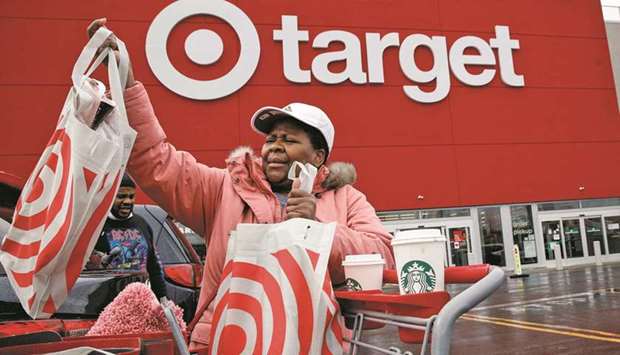Bargain hunters ventured out in chilly weather to buy Christmas gifts on Black Friday, finding stores less crowded than in years past as major US retailers opened their doors early.
A shift online, coronavirus (Covid-19) fears and less-steep discounts have thinned crowds on the day after the US Thanksgiving holiday, which kicks off the year-end shopping season.
Many shoppers are also choosing curbside pick-up rather than venturing inside.
“What a lot of customers are doing is drive-up, they don’t even enter the store. I think that’s one of the reasons it looks quiet,” said Ian Korolenko, 29, a vacuum salesperson asked by Target to help out on Black Friday. “I also think a lot of these stores do their Black Friday deals earlier in the week now, and a lot of them go online now.”
Macy’s is extending its digital delivery deadline closer to Christmas, chief executive Jeff Gennette told Reuters in an interview.
The deadline will now be December 22 or 23, versus December 15 last year.
If shoppers order by 10am, they could have same-day delivery in certain stores and categories.
“You’re still going to have that last-minute procrastinator that’s going to come in on Christmas Eve,” Gennette said.
Francisco Martinez, 22, a delivery driver, was one of more than 100 people standing outside a Walmart Supercentre in the Kilbourn Park neighbourhood of Chicago before 5am, in 20° Fahrenheit (-7 Celsius) weather.
As people queued, a Walmart worker handed out coupons for items such as Apple AirPods and watches and Gateway laptops.
“I want to get a 65” Element TV – it’s $350 off,” said Martinez, who was wearing three layers of clothing, adding: “I think I’m going to get it – it’s not as crowded as it used to be.”
As online shopping has taken off, Black Friday crowds have dwindled, particularly in 2020 when people were still unvaccinated and worried about Covid-19.
Dresden Davis, 28, said she’s doing her Black Friday shopping from her couch now that sales aren’t “Black Friday-ing” like they used to.
“I feel like a lot of places only have 20-25% off, when usually Black Friday sales are more,” said Davis, a strategy and planning specialist in Odenton, Maryland.
For November and December, online sales are estimated to hit a record $207bn, up 10% from last year, according to Adobe Digital Economy Index.
The National Retail Federation has forecast combined brick-and-mortar and online holiday sales would grow 8.5%-10.5% to between $843.4bn and $859bn.
Walmart, Best Buy and Target this year did not require vaccinated shoppers to wear masks, but some indoor malls kept existing mask requirements.
At the Chicago-area stores Reuters visited, both employees and shoppers generally wore masks.
Realtor Kelsey Hupp, 36, for years shopped at the Macy’s department store in downtown Chicago on Black Friday, and she kept with the tradition this year.
“Chicago is pretty safe and masked and vaccinated. I got my booster so I’m not too concerned about it,” she said.
A Deloitte survey showed people already spent 80-85% of their budgets before Black Friday.
“People are looking to get back to normal,” said Rod Sides, Deloitte’s US retail leader. “The early online birds, and the birds that went into the store, may get the worm.”
Another concern is that an ongoing supply chain logjam might prevent retailers from stocking sought-after items such as Hoverboard scooters, Oculus Quest 2 headsets, Nerf toys, AirPods Pro earbuds and MacBook Air laptops.


